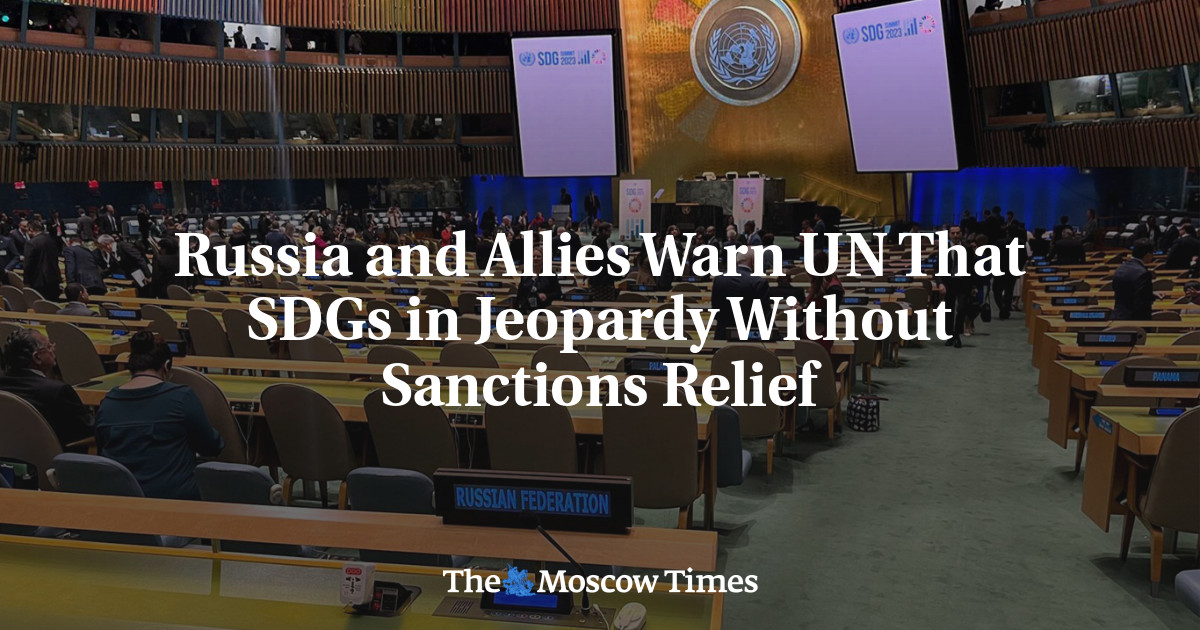
Russia has threatened to block the adoption of a new political declaration at the UN Sustainable Development Goals Summit in New York, arguing that sanctions undermine its own progress toward achieving them, the Coalition for Sustainable Development of Russia (CSDR) said Monday.
In a joint letter to the UN General Assembly, Russia — along with allies Belarus, Iran, Bolivia, Nicaragua, Cuba, North Korea, Syria, Eritrea, Venezuela, and Zimbabwe — referred to the sanctions imposed on the countries as “unilateral coercive measures” (UCMs), pointing to a significant burden caused by UCMs on countries’ capacities to implement SDGs.
“The issue of the negative impact of UCMs is an existential one for our peoples. A third of the world’s population is affected by these illegal measures,” the countries stated in the document obtained by The Moscow Times.
The move comes as independent experts say Russia is failing to meet its SDGs. Despite having made some progress toward these goals by 2022, the war on Ukraine brought many initiatives in Russia to a halt.
Specifically, CSDR pointed to the suspension of international cooperation in pharmacology, clinical research and drug development, which it said poses a challenge to achieving SDG 3 (Good Health and Well-Being).
Additionally, Russian industry has lost a significant incentive for decarbonization — the European Union’s cross-border carbon tax — due to a substantial decline in export markets and the departure of many international companies following the invasion of Ukraine. Progress toward SDG 13 (Climate Action) is further hindered by Russia’s lack of reporting of greenhouse gas emissions that result from its military actions in Ukraine.
The exodus of Western renewable energy companies has also put SDG 7 (ensuring access to affordable and clean energy) in jeopardy. Losing access to modern technologies and foreign investment, as well as the country’s economic decline since 2022, have also hampered Russia’s progress toward achieving the SDGs.
However, Russian Deputy Prime Minister Alexei Overchuk said during his speech at the summit that Russia has achieved more than half of the global SDG indicators in recent years.
Overchuk attributed the global slowdown and regression in SDG implementation to macroeconomic policy miscalculations by the U.S. and EU, which led to increased inflation. He also criticized an “unbalanced” energy-climate policy promoting forced economic “greening.”
“The negative impact on the global economy […] was exacerbated by the policy of illegal unilateral sanctions against Russia, which reached unprecedented scales last year,” the minister added.
“As a result, developing countries, especially the least developed ones, have become true hostages of the situation.”
Despite the collective appeal from Russia and its allies, the new declaration was adopted at the opening of the SDG Summit on Monday. Nevertheless, experts believe that countries advocating for the lifting of sanctions may still oppose the agreed-upon document in the following days.
Nelya Rakhimova, chair of the Coalition for Sustainable Development of Russia, believes that Russia is using the SDG agenda to manipulate the world into repealing sanctions, prompting other countries to follow suit.
“It’s important to understand that these ideas were promoted by Russia during multiple negotiations already before the war in Ukraine,” Rakhimova told The Moscow Times. “Due to political depolarization in the world, more countries have joined this argument to raise the issue of sanctions for SDG implementation.”
Rakhimova also noted that there is no evidence that Russia has been genuinely concerned about SDG implementation from the beginning, pointing out that Russia’s National Projects are not explicitly aligned with the UN’s Sustainable Development Agenda.
“Therefore, I would say that right now the SDGs are just another soft diplomatic tool for Russia,” she concluded.
The 2023 SDG Summit brought together political and thought leaders from around the globe to review the implementation of the 2030 Agenda for Sustainable Development.
Russia, along with other 192 countries, in 2015 signed and adopted the 2030 Agenda, which focuses on 17 Sustainable Development Goals in areas including eradicating poverty, ensuring people live healthy lives, reducing inequality and mitigating climate change.